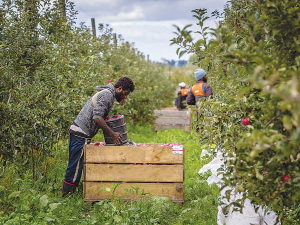Damien O’Connor: NZ united on global trade
When it comes to international trade, politicians from all sides of the aisle are united, says Labour's trade spokesman Damien O'Connor.
 The Government has announced travel dates for quarantine travel for RSE workers from Vanuatu, Samoa and Tonga.
The Government has announced travel dates for quarantine travel for RSE workers from Vanuatu, Samoa and Tonga.
As part of a programme of work to reopen borders and reconnect with the world, the Government has announced the commencement dates for quarantine free travel for Recognised Seasonal Employer (RSE) workers into New Zealand.
From 4 October, RSE workers from Vanuatu can begin arriving in New Zealand and from 12 October RSE workers from Samoa and Tonga can begin arriving.
“This will provide much needed certainty for our growers as they gear up for summer and autumn harvesting,” says Agriculture Minister Damien O’Connor.
People arriving under the scheme must meet strict health conditions, including requirements to be vaccinated with at least one dose pre-departure, the completion of a period of self-isolation on arrival, and the returning of two negative Covid tests on Day 0 and Day 5. Employers are expected to provide the self-isolation facilities.
If workers have only received one dose of the vaccine, they are expected to complete their vaccination after they arrive in New Zealand.
“Despite the challenges of a Covid world, which has constrained the number of RSE workers who could come through MIQ, the Government has remained committed to the RSE scheme,” O’Connor says.
“The horticulture sector is worth over $6 billion to New Zealand exports. Having people coming to our shores through the RSE scheme to harvest and prune is essential to us maintaining our economic recovery from Covid-19, a recovery which is very much export-led.
“We are also aware of the positive impact the scheme has on our Pacific neighbours with the benefits of the hard work done by RSE workers flowing back home from our shores.”
The commencement of quarantine free travel for RSE workers forms a pilot scheme to test systems in preparation for a broader and safe reopening of the borders.
“We will closely monitor this first stage of one-way quarantine-free travel as we want to expand eligibility for quarantine-free entry to New Zealand from these countries and Tokelau when we can be sure it is safe to do so.”
O’Connor says he wants to thank Samoa, Tonga and Vanuatu for their co-operation as well as the horticulture and viticulture sectors for their collaboration.
Up to 14,400 RSE workers normally come through New Zealand each year, with approximately 10,500 being in the country at peak harvesting times pre-Covid. As at August 2021, approximately 7,000 RSE workers were in the country.
The World Wide Sires National All Day Breeds Best Youth Camp Best All Rounder plaudit has become family affair, with 2026 Paramount Cup winner Holly Williams following in her sister Zara's footsteps.
DairyNZ is giving New Zealand farmers a unique opportunity to gain hands-on governance and leadership experience within the dairy sector.
Herd improvement company LIC has posted a 5.2% lift in half-year revenue, thanks to increasing demand for genetics.
According to the latest Fresh Produce Trend Report from United Fresh, 2026 will be a year where fruit and vegetables are shaped by cost pressures, rapid digital adoption, and a renewed focus on wellbeing at home.
The Roar is a highlight of the game hunting calendar in New Zealand, with thousands of hunters set to head for the hills to hunt male stags during March and April.
OPINION: The past few weeks have been tough on farms across the North Island: floods and storms have caused damage and disruption to families and businesses.